Last Chance to Catch NYC's Holiday Notalgia Train
We met the voices of the NYC subway on our nostalgia ride this weekend!


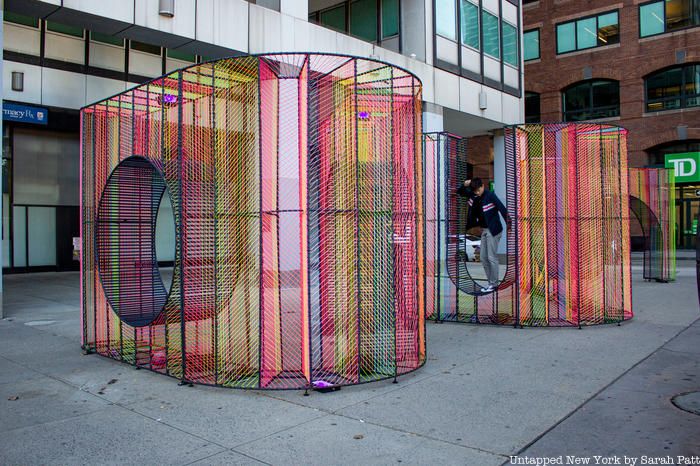
November this year is a crucial moment for many New Yorkers, with the election at the forefront of everyone’s attention. However, the rest of the month is filled with exciting art events and installations. As many people retreat indoors and shield themselves from the early winter breeze, now is a great time to visit some of the newest public art installations throughout New York City without having to worry too much about being around other people. Remember to wear a mask and practice social distancing as you check out these art installations, from the empowering Medusa Sculpture sitting across from the city’s criminal courthouse where many abusers were tried to the Mother Cabrini Statue unveiled by Governor Andrew Cuomo in Battery Park City. You have to catch a glimpse of the “plastic bag store” before it closes this month as well as take a ride to Rockaway for Shantell Martin’s new mural. Here are the public art installations on display in New York City this November:
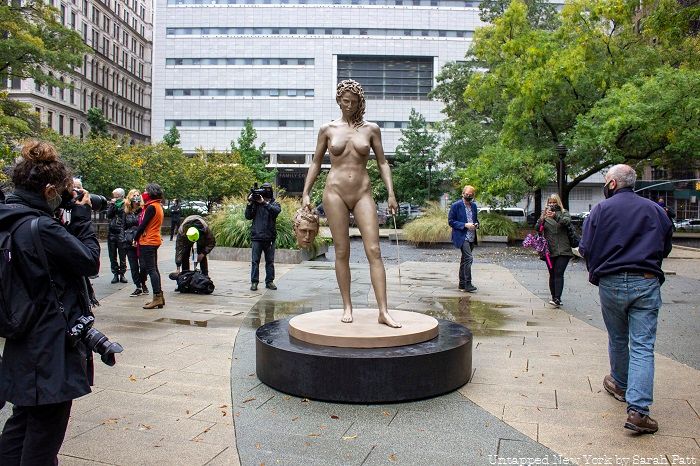
A seven-foot tall bronze sculpture of Medusa was unveiled in Collect Pond Park in October, across from the New York County Criminal Court in Lower Manhattan. A collaboration between Medusa With The Head Project (MWTH) and New York City Parks, Medusa With The Head of Perseus is meant to question Medusa’s portrayal and narrative in Greek mythology and reimagine an inverted narrative.
Garbati made the original Medusa sculpture in 2008. He posted photos of it on social media in 2018, at the height of Me Too movement and the year the Argentine Senate rejected a bill that would fully decriminalize abortion during the first 14 weeks of pregnancy. The photos went viral, and the sculpture became a symbol of resistance for women. Garbati seeks to change the traditional narrative of Medusa by portraying her in a somber moment of self-defense, holding the head of her slayer. According to the organizers of the sculpture, Medusa With The Head of Perseus has been deliberately sited across the street from the courthouse where “high profile abuse cases, including the recent Harvey Weinstein trial.”
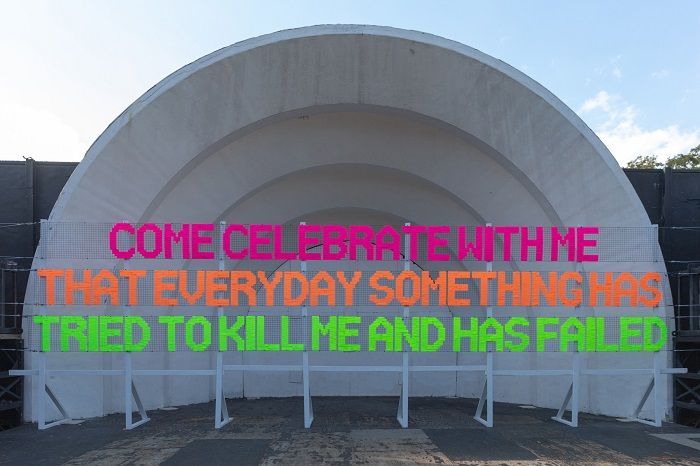
Photo by David Andrako
Prospect Park Bandshell has turned into a venue for artists lately, with the unveiling of a public art project commissioned by Brooklyn artist collective Brooklyn Hi-Art! Machine. Helmed by BRIC and Prospect Park Alliance in their partnership with NYC Parks, the art project utilizes the words of the poet Lucille Clifton to offer “a message of resilience and perseverance.” “This public art work provides a message of strength and joy, celebrating and uniting our community during these difficult times,” said Kristina Newman-Scott, BRIC’s President, in a press statement. “We are delighted to continue our important partnership with the Prospect Park Alliance through this meaningful activation of the Bandshell inspired by a local and engaged arts collective.”
Displaying themes of racial equity and a different narrative on unoccupied public spaces in the background, Brooklyn Hi-Art! Machine’s project will be on view from October, 2020 through May 2021.
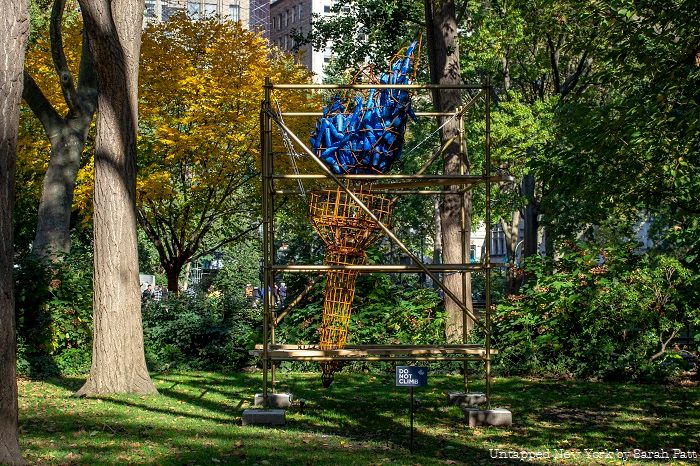
Amidst the greens of Madison Square Park is a torch whose fire is made up of the arms of blue mannequins. An outdoor art project, Light of Freedom speaks on the latest political turmoil engulfing the nation, with a global pandemic that affects the lives of tens of millions of Americans and large-scale social justice protests for racial equality that is long overdue. The torch is meant to represent the beacon of democracy by closely resembling the torch held by Lady Liberty that had been displayed in the same park before.
The artist Abigail DeVille said that the project is inspired by the words of abolitionist Frederick Douglass. “In my research, I have found that the first Blacks to be brought to New York City were eleven Angolans in 1626. That makes people of African descent the second-oldest group of settlers in New Amsterdam, after the Dutch,” DeVille said on Madison Square Park’s website. “Unfortunately, history has erased the contributions and victories of this group. I want to make something that could honor their lives and question what it means to be a New Yorker, past, present, and future.”

The Downtown Alliance is taking over Water Street this month with two new art installations enriching the street’s scenery. Designer studio Hou de Sousa’s “Ziggy” at 200 Water Street brilliantly combines steel structure and vibrant lights with cords, and FANTÁSTICA’s “Out-of-Office” transfers the workspace environment to an outdoor setting, seemingly responding to the current time as people are no longer commuting to offices for work due to the pandemic.
“These works will animate public space at a time when we are appreciating our open spaces more than ever,” said Downtown Alliance President Jessica Lappin on the organizaton’s website. “Ziggy is whimsical and uplifting, and ‘Out-of-Office’ provides a practical and inspiring take on a new approach to public seating in the COVID era. We can all use a little more beauty and some fresh ideas these days.”
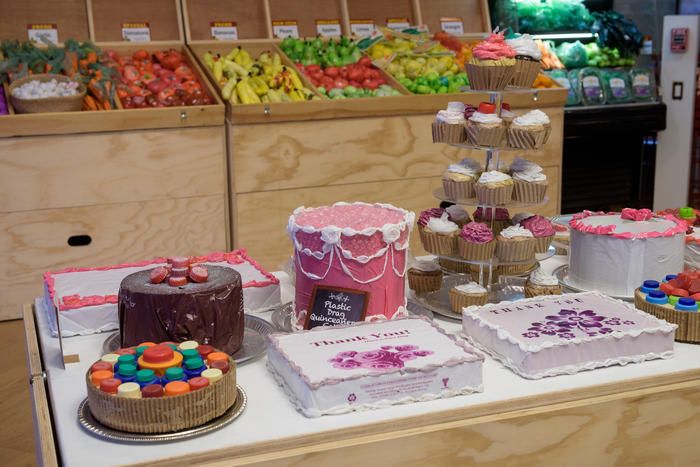
Photograph by Ian Douglas
Starting in October, you can visit “The Plastic Bag Store” at 20 Times Square, a public art installation and immersive theater project that was delayed from March due to Covid-19. The Plastic Bag Store is a work by artist and director Robin Frohardt, produced by Pomegranate Arts and presented by Times Square Arts. It will be open free to the public through November 7, 2020 from Wednesdays to Sundays, with advance reservations.
The store will have thousands of hand-sculpted “products” made from discarded, single-use plastics. You’ll find everything you can find in a grocery store, like meat, produce, cakes, toiletries, dry goods, and even sushi rolls. According to Times Square Arts, “With The Plastic Bag Store, Robin Frohardt employs humor and craft to examine our culture of consumption and convenience and the enduring effects of single-use plastics. Small groups will enter The Plastic Bag Store for a 60-minute immersive experience, featuring hidden sets and a captivating puppet film that explores how the overabundance of plastic waste we leave behind might be misinterpreted by future generations.”
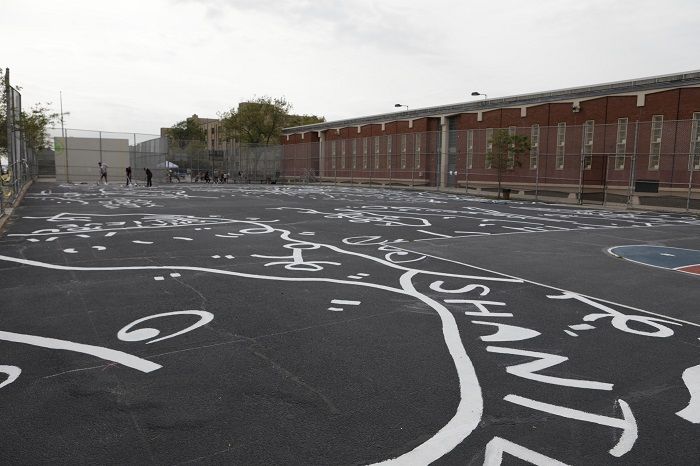
Photo by Jorge Marrón
Undulating and interwoven white lines on the black surface of the “Big Yard” Seaside playground at Waterside Children’s Studio School make up a new 16,000-square-foot mural by award-winning artist Shantell Martin. Located near the new Rockaway Hotel and used by 700 students and numerous community members, the outdoor recreational space provides the ground for Martin to showcase her mural to pedestrians as well as guests who look down from the rooftop of the Rockaway Hotel.
The mural consists of iconic, monochromatic black and white interconnected lines, Martin’s signature style of drawing, that come together in various text and image formats in an effort to inject more energy and aesthetics into the Rockaway community and its urban beach landscape. “Because of the scale, there are multiple ways to experience the piece. What you have on the ground is very different from the experience you have of it from a higher perspective where you get to see how the lines, words, and faces are actually interacting with each other,” Martin said. “It’s all about discovery and letting people interact with it the way they naturally feel inclined to.”
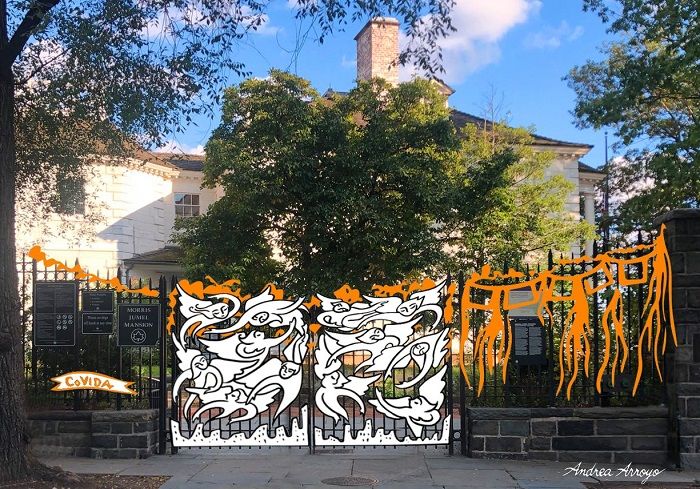
Photo Courtesy of Morris-Jumel Mansion
Internationally renowned artist Andrea Arroyo brings glimmers of hope and optimism to a world otherwise consumed by a devastating global pandemic. “CoVIDA-Homage to Victims of the Pandemic” pays tributes to those who have lost their lives to the pandemic while praising the resilience of the community and applauding those who continue to work on the frontline.
With flower garlands in the cempasúchitl color that resembles flowers used for Latin America’ Day of the Dead, the outdoor public art installation showcases wing figures that symbolize the wings of freedom and cityscape’s silhouette that conveys the city’s recovery on the gates and fences of Roger Morris Park. CoVIDA will be on view from November 2nd to December 31th.
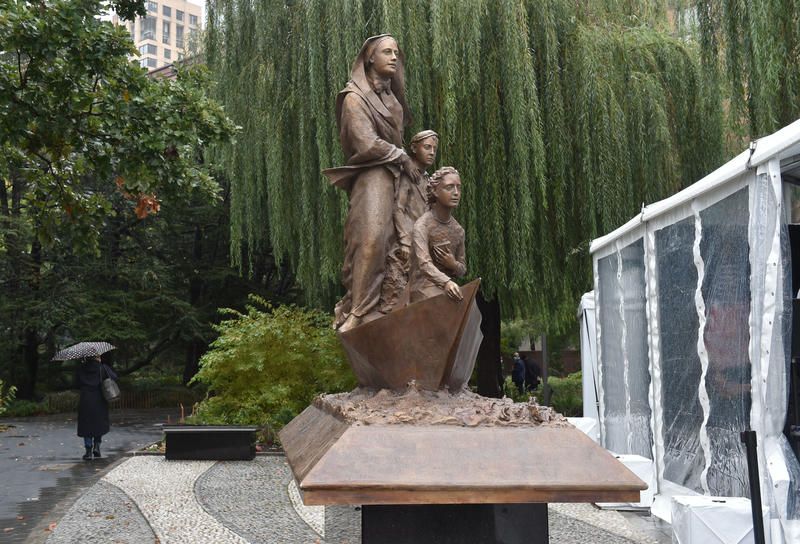
Photo: Kevin P. Coughlin / Office of Governor Andrew M. Cuomo
A new statue designed and created by the sculptors Jill Burkee-Biagi and Giancarlo Biagi dedicated to Mother Cabrini was unveiled by Governor Andrew Cuomo in New York City’s Battery Park. Located just south of the South Cove on the Battery Park Esplanade, the statue is in honor of Saint Frances Xavier (Mother) Cabrini. Born in Sant’Angelo Lodigiano in modern-day Italy in 1850, Mother Cabrini was the first American citizen to be made a saint by the Roman Catholic Church.
Governor Cuomo announced plans for the creation of a Mother Cabrini statue and memorial on Columbus Day 2019. The announcement came in the wake of controversy surrounding the She Built NYC initiative from Mayor de Blasio and his wife Chirlaine McCray. She Built NYC will add five new statues of women in New York City, including one of Shirley Chisholm, the first African-American woman to serve in Congress. The five women were selected in part through a public voting process, and although Mother Cabrini won the vote, she was not chosen to be honored. A spokesman for She Built NYC stated at the time that she had not been selected because tributes already existed.
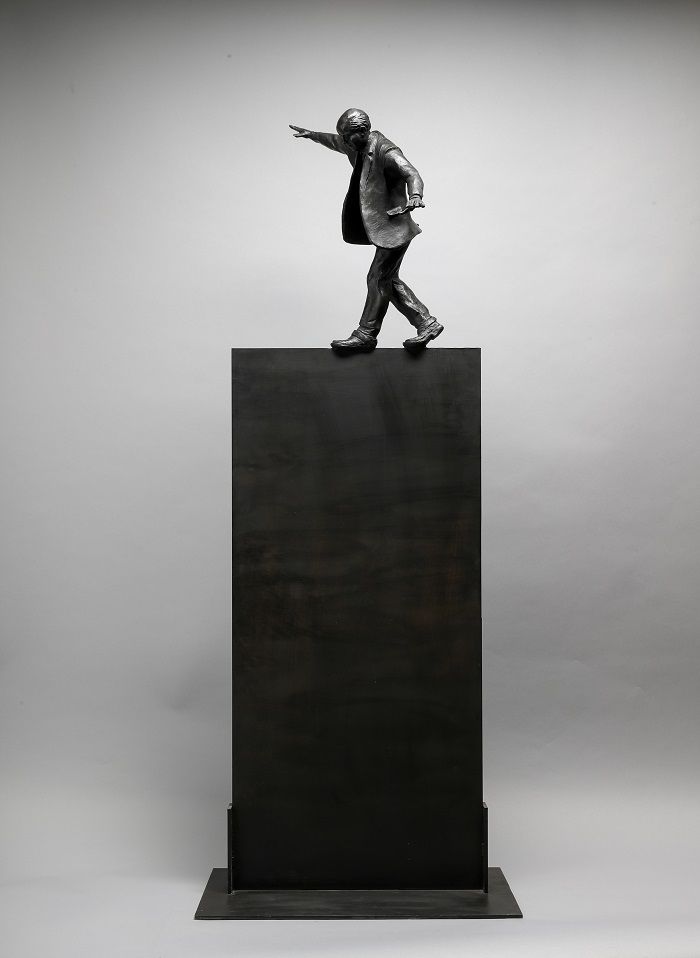
Photo Courtesy of Cavalier Galleries
Artist Jim Rennert’s two new sculptures in the Theatre District reflect the current time by emphasizing the struggles to make a living through the form of athleticism. Over 8.5-feet tall, Walking the Tightrope and WTF are representative of the artist’s past works that highlight both the physical and psychological difficulties of living in a world dominated by corporate competitions.
“As an entrepreneur, whether dealing with employer’s products, home life or working our way up the corporate ladder, the visual juxtaposed figure on a tightrope is something that resonates with us all,” said Jim Rennert in a press statement. “Once you’ve thought big, and then found a perspective of where you fit in, you can sometimes have a WTF moment. And in 2020, WTF seems to describe how we all feel about dealing with this year.”
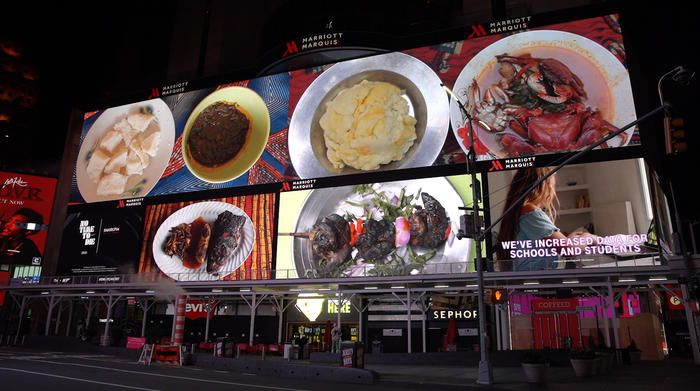 Megan Stahl for Times Square Arts
Megan Stahl for Times Square Arts
November’s Midnight Moment series from Time Square Arts features Table Manners by artist Zina Saro-Wiwa. Visible on Time Square every night from 11:57 pm to midnight, the newest art exhibition centers around people in the Niger Delta Region and their eating rituals. In the videos, all the individuals are filmed while eating their meals with their hands, but instead of looking elsewhere, they stare straight into the camera. The format allows the artist to convey “a celebration of community, tradition, and a collective act of memory.” Saro-Wiwa’s work, according to Time Square Arts website, is “candid and vulnerable yet undeniably confrontational,” raising “consciousness around the socioeconomic and political troubles the oil-producing Nigerian region faces.”
“Table Manners appearing as the Midnight Moment is a special curatorial opportunity. It suggests the magic of the Midnight Feast which is the inspiration for my opening night performance,” Saro-Wiwa said in a press statement. “My hope is that people can come together — socially distanced of course — and commune with not only the people of Ogoniland and Port Harcourt in Nigeria who I have filmed, but also with each other. To look each other in the eye and just be.”
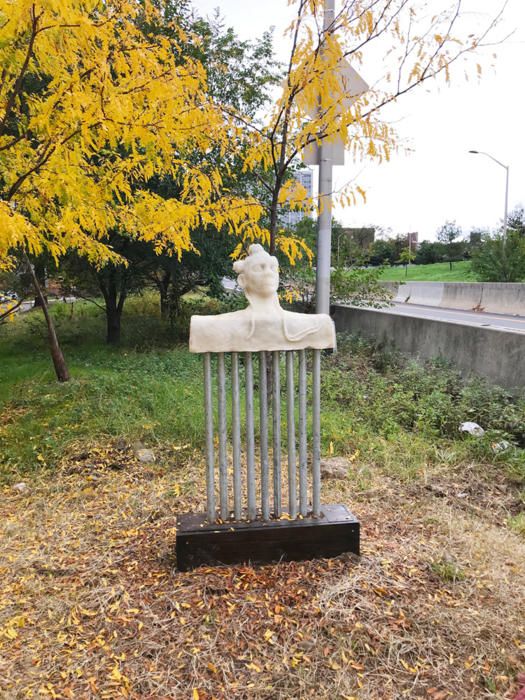 Photograph Courtesy of Elmhurst Sculpture Garden
Photograph Courtesy of Elmhurst Sculpture Garden
“Artist Yvonne Shortt’s newest sculpture African American Marbleization: AfroPick: Bantu Knots and the Underground Railroad is the latest addition to the African American Marbleization series, a collection of outdoor sculptures by the artists that pays tributes to people of color and commemorate their history. Based on ancient wood and stone designs made from 5,500 years ago, the sculpture sits in Elmhurst Sculpture Garden which was created in 2016 by a group of volunteers who cleaned up the area.
The face of the sculpture is fractured in order to signify the anguish African Americans experienced in their lives, and the piece presents the path they took in their request for freedom, extending from the U.S. South to New York and all the way up to Canada.
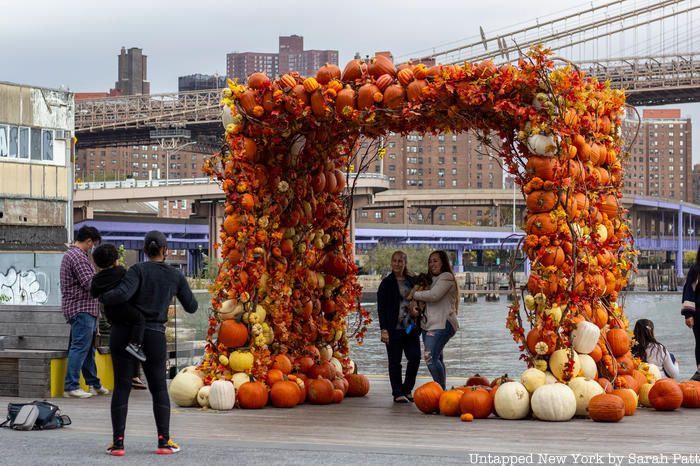
Looking for a great fall photo op? Head to Manhattan’s Seaport District along the East River. At the Heineken Riverdeck at Pier 17 passersby will find a giant arch made out of 500 gourds. Standing under the arch, you will be surrounded by pumpkins of all shapes, sizes, and colors. There are tiny yellow pumpkins, large orange ones, and white pumpkins, decorated with intertwining leaves and branches.
The arch is situated to give you an amazing view of the Brooklyn Bridge and at night, the arch lights up with an orange glow. You can take pictures at the pumpkin arch now until Thanksgiving. Keep reading to see more public art from previous months still on display!
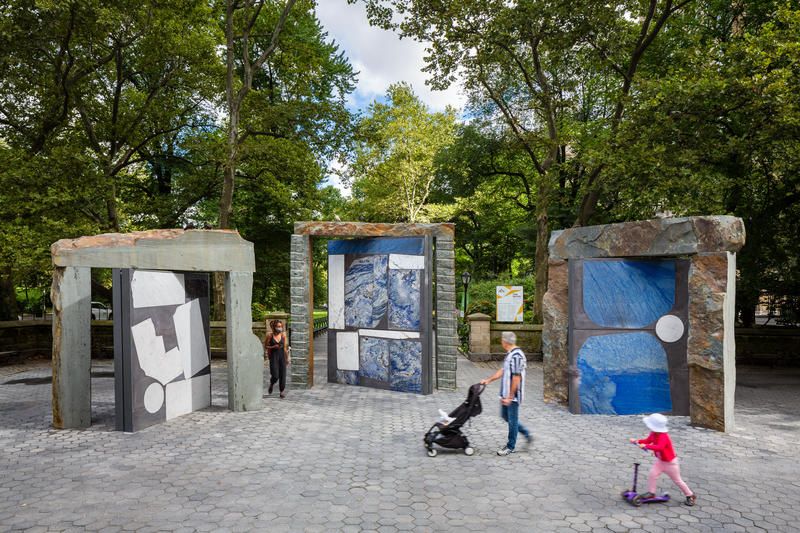
Photo by Nicholas Knight, Courtesy Public Art Fund
At Doris C. Freedman plaza there are three newly created stone sculptures made with a hybrid of imported and native materials. The mastermind behind the installation is artist Sam Moyer who uses this creation as an opportunity to pay homage to Public Art Fund founder Doris C. Freedman.
According to Public Art Fund’s website, “these polished stones bear the markings and shapes of their original uses. They also display the unique colors, patterns, and geological history of their sources — quarries in Brazil, China, India, Italy, and beyond. Each stone in Moyer’s mosaic compositions takes on an even more striking hue against the others and the locally-quarried rock, an apt metaphor that encourages us to consider the diverse character of our city and our interconnected lives within it.” The installation will run from September 16, 2020 to September 12, 2021.
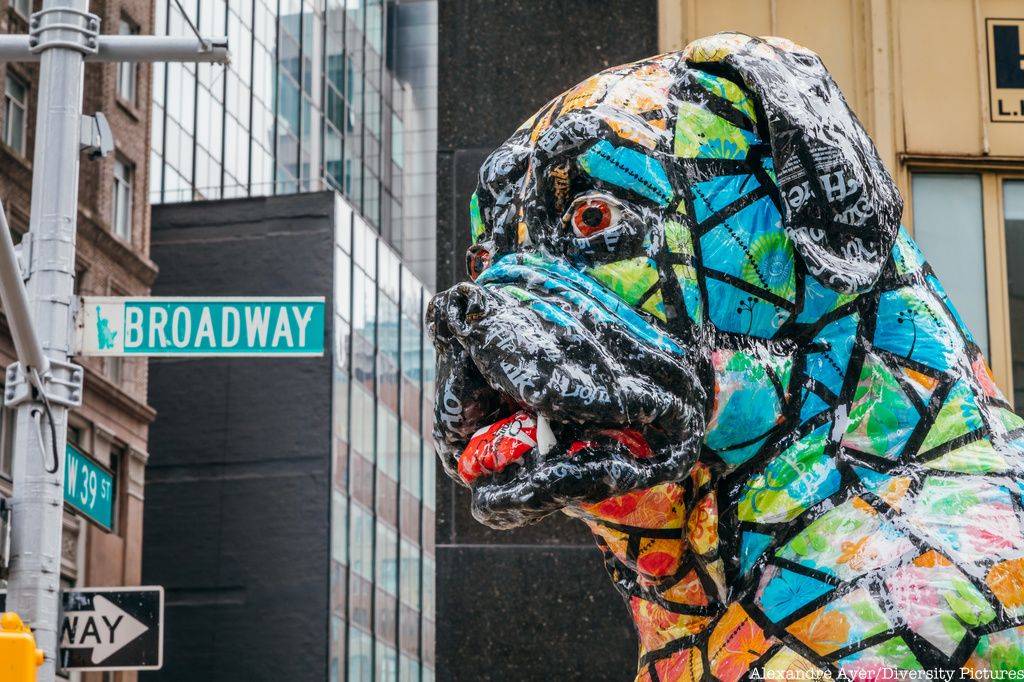
Photo: Alexandre Ayer/Diversity Pictures
“Doggy Bags,”, the latest art installation on Broadway in the Garment District is up and is positively pooch-tastic. The works by New York-based artist Will Kurtz entitled “Doggy Bags” are all made of recycled materials. On display are multiple breeds including an English bulldog named Harriet, chihuahua called Harriet, a pug named Maisy, a bassett hound called Stanley, and a bull mastif known as Daphne. The works are part of a year-round program from the Garment District Alliance and this fall there is an additional impetus: to welcome New Yorkers back to Midtown Manhattan amidst the ongoing city reopening.
“Doggy Bags” will be up through November 20th. Barbara A. Blair, president of the Garment District Alliance said at the opening, “As we welcome New Yorkers back to the neighborhood, we’re proud to showcase Will Kurtz’s colorful, unique dog sculptures through the Garment District Space for Public Art program. We know these beautiful sculptures – made with all recycled materials – will bring positivity, comfort and joy among visitors, and we encourage all to stop by and enjoy the exhibition this fall.”
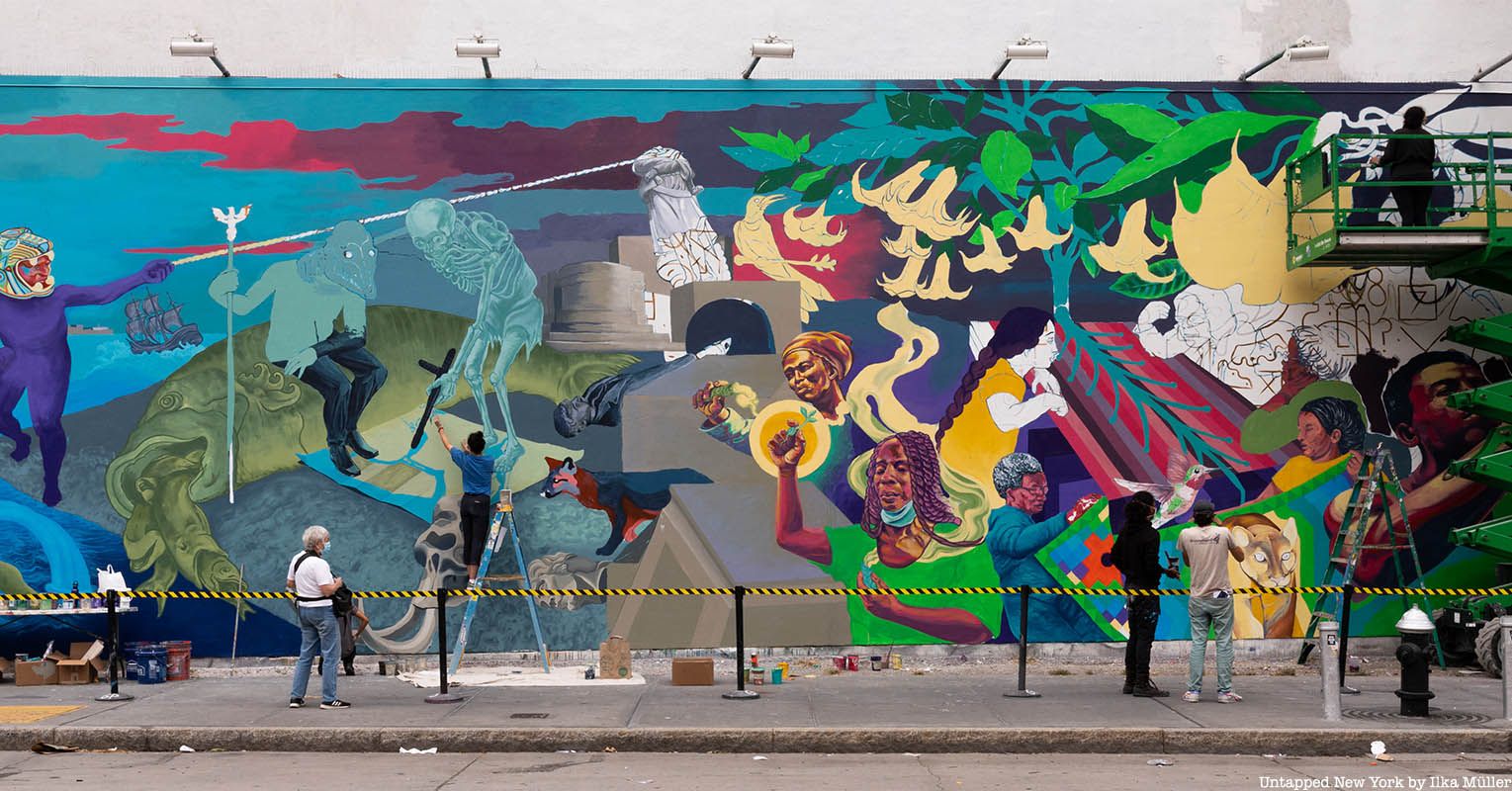
On the Bowery graffiti wall, Groundswell has completed the newest mural to be seen at the street art site in a year. The work was designed by artist Raul Ayala and painted by a team of ten youth artists The last piece, by Japanese artist Tomokazu Matsuyama “Matzu” was completed in September of last year. The mural for 2020 coincides with the 25th anniversary of Groundswell, an organization that uses art for change. The new mural at the Bowery graffiti wall, located on Houston Street between Bowery and Elizabeth streets, incorporates numerous portraits of Black figures and also has a seafaring folklore theme with mythical creatures pulling down statues. On the left side, the skyline of Manhattan appears.
Equidorian-born Raul Ayala has said, “For me, building imagination and sharing knowledge alongside a younger generation of artists is a great manifestation of the fruits of this shift. With this mural, we are also bringing intergenerational participation into a future that honors our past while actively creating a different path of existence.”
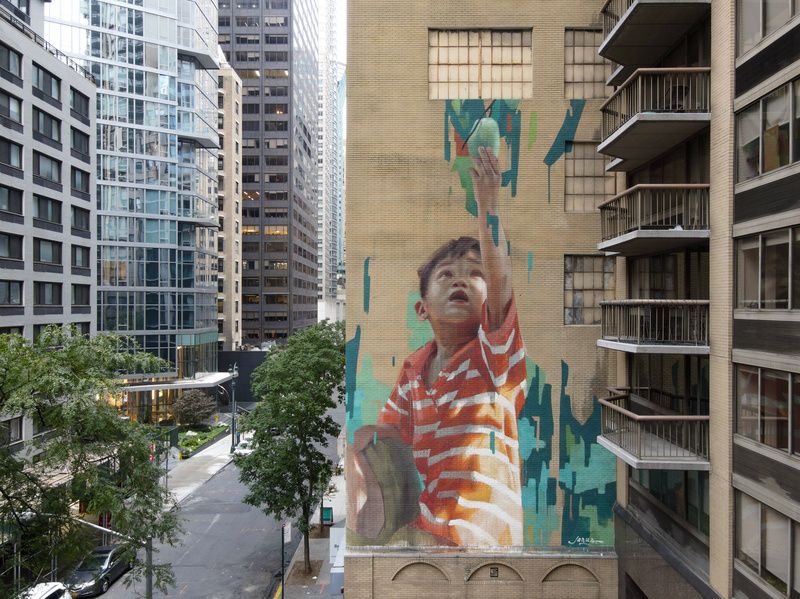
Photo by @just_a_spectator, courtesy Street Art for Mankind
In honor of the United Nations’ 75th Anniversary, a street art mural has been completed a few blocks from the UN headquarters at 243 East 44th Street. The mural is designed by street artist Emmanuel Jarus, in a partnership between the UN and Street Art for Mankind.
According to a press release, “The theme for the mural is inequality and zero hunger, amplifying the voices of the over 1 million people across the world who have told the UN this year that access to basic services, including food, is a top priority for the future they want. Many of our readers and Insider members filled out the survey that led to the results and participated in the events we programmed in Untapped New York’s collaboration with UN75.
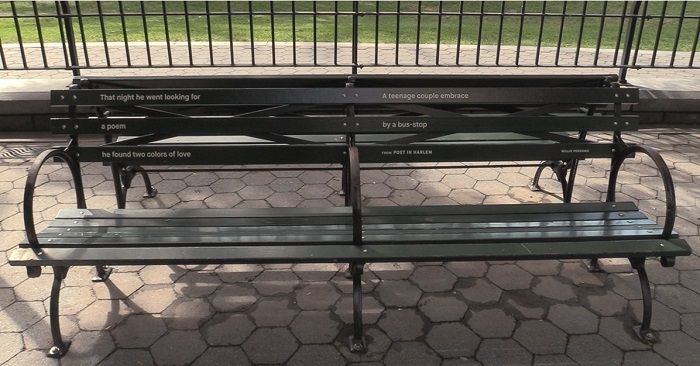
Photo by Daniel Terna
If you walk along the northern length of Battery Park City ,you will find words and phrases from famous poets on benches, banners, pathways, pavers and signs. These words are the work of Poets House and Battery Park City Authority. Together, the organizations launched the Poetry Path which showcases more than 40 poets and their works.
The poems explore the relationships between people, nature and the urban landscape. The installation will be up through 2021.
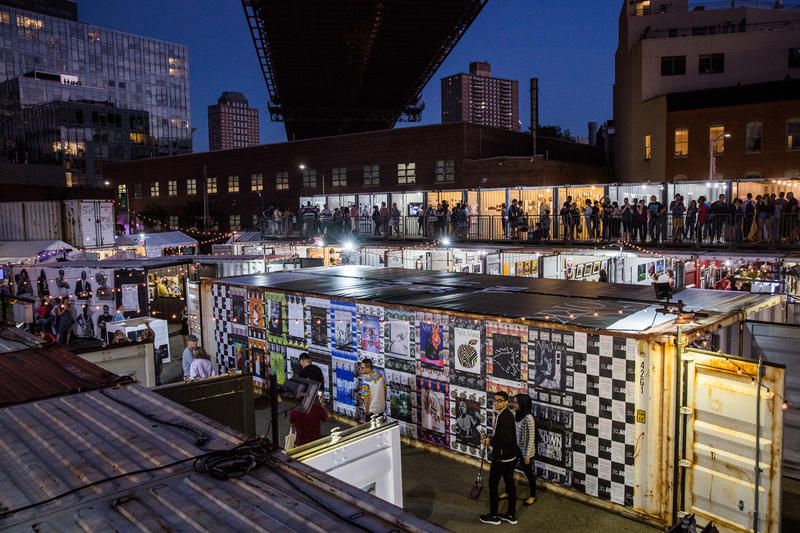
Courtesy of Jessica Bal for United Photo Industries
The ninth annual Photoville festival relaunches this fall with dozens of outdoor art exhibitions shown to visitors from September 17 to November 29, 2020. Arranged by a non-profit organization based in New York, the exhibitions are dotted throughout New York City, with different photo installations in every borough.
Besides the physical public exhibitions, art enthusiasts can also enjoy a variety of free online programs from the comfort of their homes, with events such as online storytelling, artist talks and workshops.
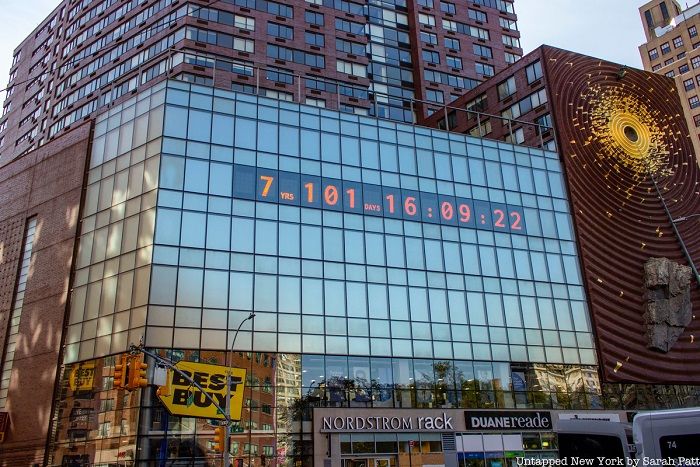
As part of the lead up to Climate Week, the Union Square clock has been repurposed as a “Climate Clock” showing what time the world has left to take action on climate change. As per the Climate Clock website, the Climate Clock “follows the methodology of the carbon clock made by the Mercator Research Institute on Global Commons and Climate Change (MCC) which uses data from the recent IPCC Special Report on Global Warming of 1.5°C. The report states that starting from 2018, a carbon dioxide budget of 420 Gt of CO2 gives us a 67% chance to stay under 1.5°C of warming.” The countdown shows, at current rates of emission, how long it will take to burn through the earth’s “carbon budget” or the amount of carbon dioxide that can be released into the atmosphere while keeping global warming to 1.5°C above pre-industrial levels.
A second number, not seen in the Union Square Climate Clock, shows the “growing % of the world’s energy currently supplied from renewable sources. This is our lifeline. Simply put, we need to get our lifeline to 100% before our deadline reaches 0.”
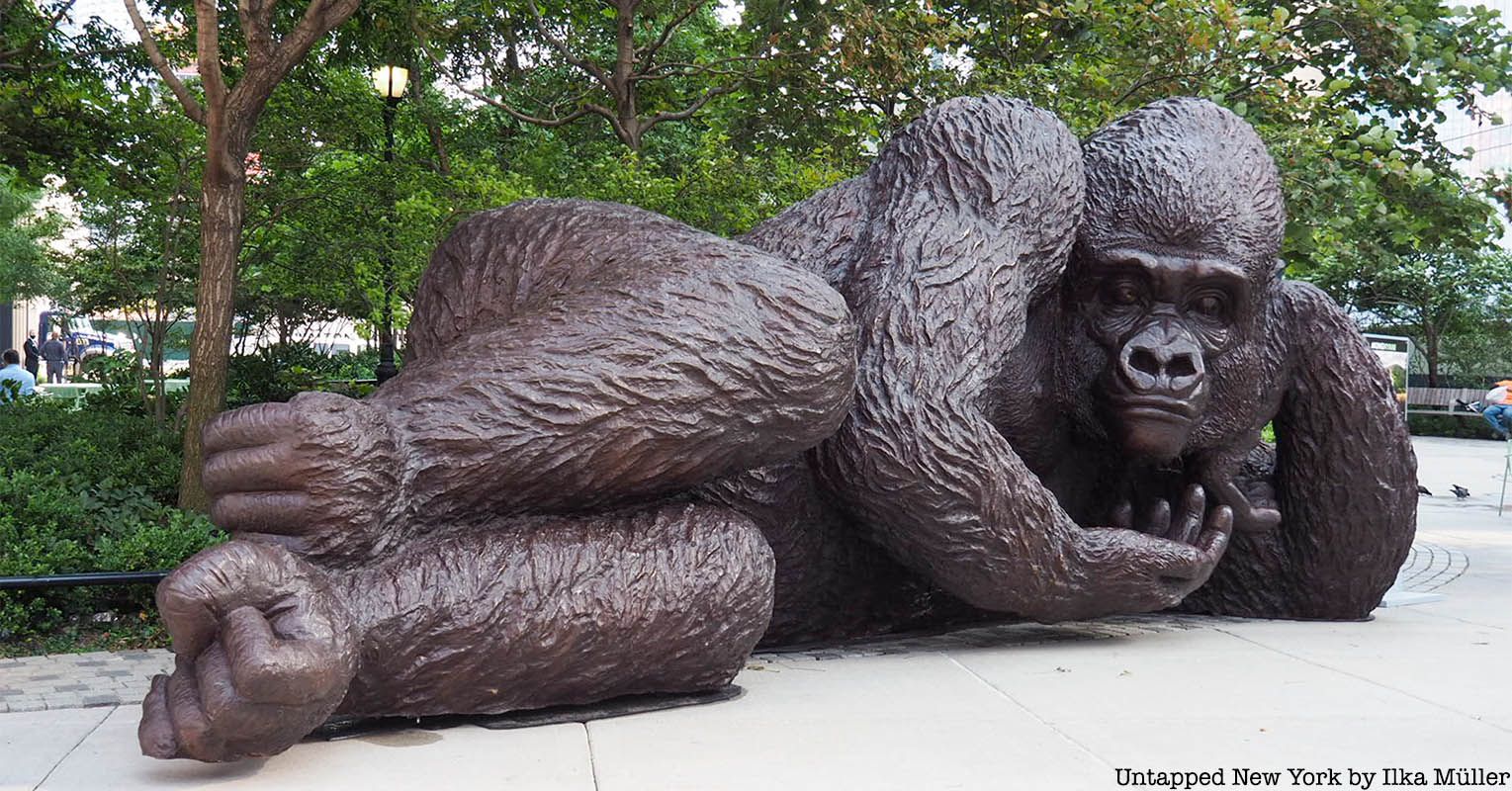
The largest bronze gorilla statue in the world has arrived in New York City. Since last week, King Nyani has been on display at Bella Abzug Park in Hudson Yard. The statue is designed to raise awareness about the endangered mountain gorilla species, of which only around 1000 remain worldwide, and to change the perception of gorillas among New Yorkers. Instead of terrorizing New York City atop the Empire State Building, this gorilla will be giving out free hugs to any willing New Yorkers. In fact, its giant hands are designed to hold 2 to 3 people at a time.
King Nyani is a continuation of a series of works by Gillie and Marc, donated to place around the world, which have highlighted endangered species as part of their initiative Love the Last. Their statues of the last three northern white rhinos were on display in Astor Place in 2018 (now only two of the rhinos remain). King Nyani is based on an actual gorilla, the head of a family of mountain gorillas that Gillie and Marc met on a trip to Uganda. It is almost 23 feet long, 8.5 feet high and weighs 4,766 pounds. See more photos here.
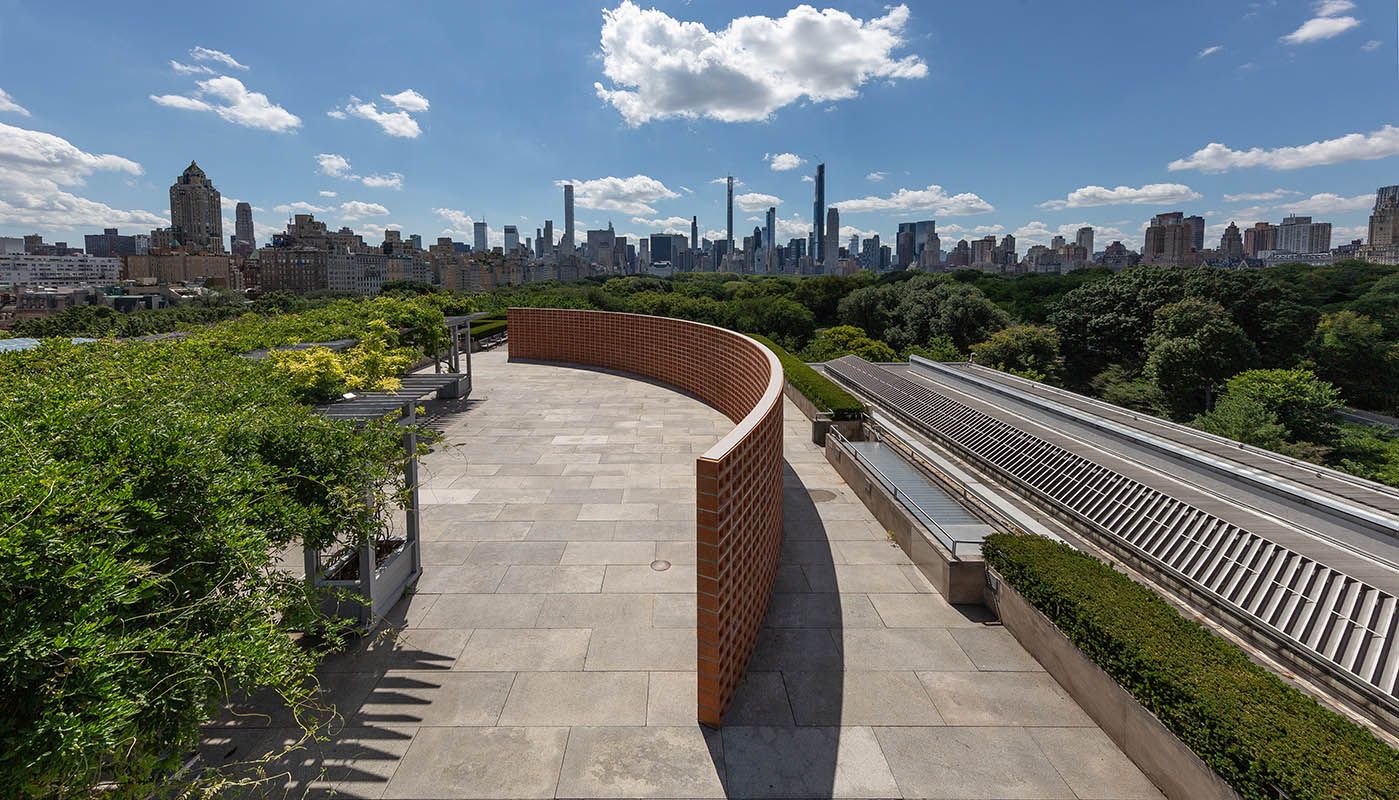
The 2020 Met Roof Garden Commission by Héctor Zamora, Lattice Detour. Photo courtesy of the artist.
Last week, the Metropolitan Museum of Art unveiled several new exhibits, including this year’s Roof Garden Commission by Héctor Zamora, Lattice Detour. From a distance, Lattice Detour looks like an abstract sculpture, its material construction not completely obvious. What’s apparent is the disruption it provides to the view so traditionally celebrated and embraced by past exhibitions. But this move is deliberate. According to the Museum, Zamora “intends for us to have this initial response: such is the impact of barriers that thwart access to open, expansive outlooks on the world.” It perforates our view but intrigues us, and its position on the roof, invites visitors to go around it.
The terra cotta bricks, made of Mexican earth, which form the basic unit of Lattice Detour are open to allow for light and air. It is meant to reference “celosia“, “openwork brick structures found in vernacular architecture of the Middle East, Africa, Iberia, and Latin America that provide shade and ventilation,” states the museum. See more photos here.
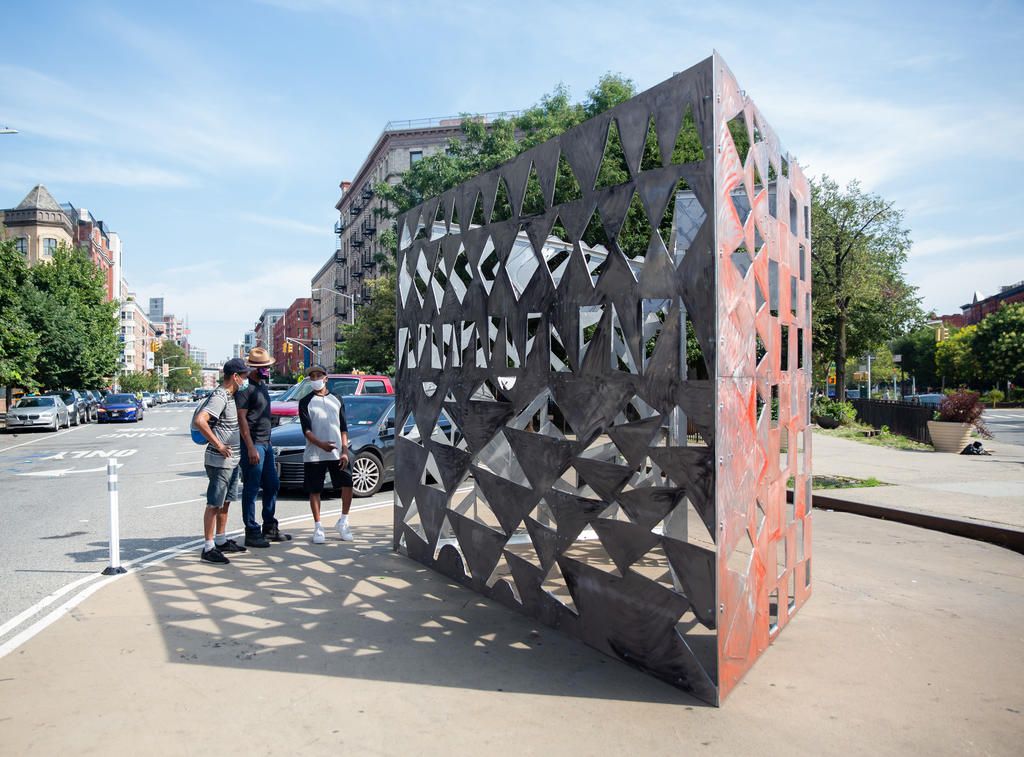
Photo courtesy of the Department of Transportation.
The New York City Department of Transportation’s Art Program, Harlem based non-profit, the Marcus Garvey Park Alliance and New York-based artist Kenseth Armstead recently unveiled the Boulevard of African Monarchs monument. Located at 116th Street and Adam Clayton Powell Blvd/St. Nicholas Avenue in Manhattan, the sculpture features representations of the multiple African kings. The sculpture itself is equally grand, a 10′ x 10′ x 10′ monument made to emulate the style of Tiebele house paintings, a style of artwork made by African women long before the transatlantic slave trade began its cruel existence.
Boulevard of African Monarchs is the first sculpture in Armstead’s Sankofa_series. The works are meant to celebrate Africans and their diaspora and to proclaim that Black Lives Matter with bold, three-dimensional artwork. The work is a monument to Black beauty, and is free for all to view in public.
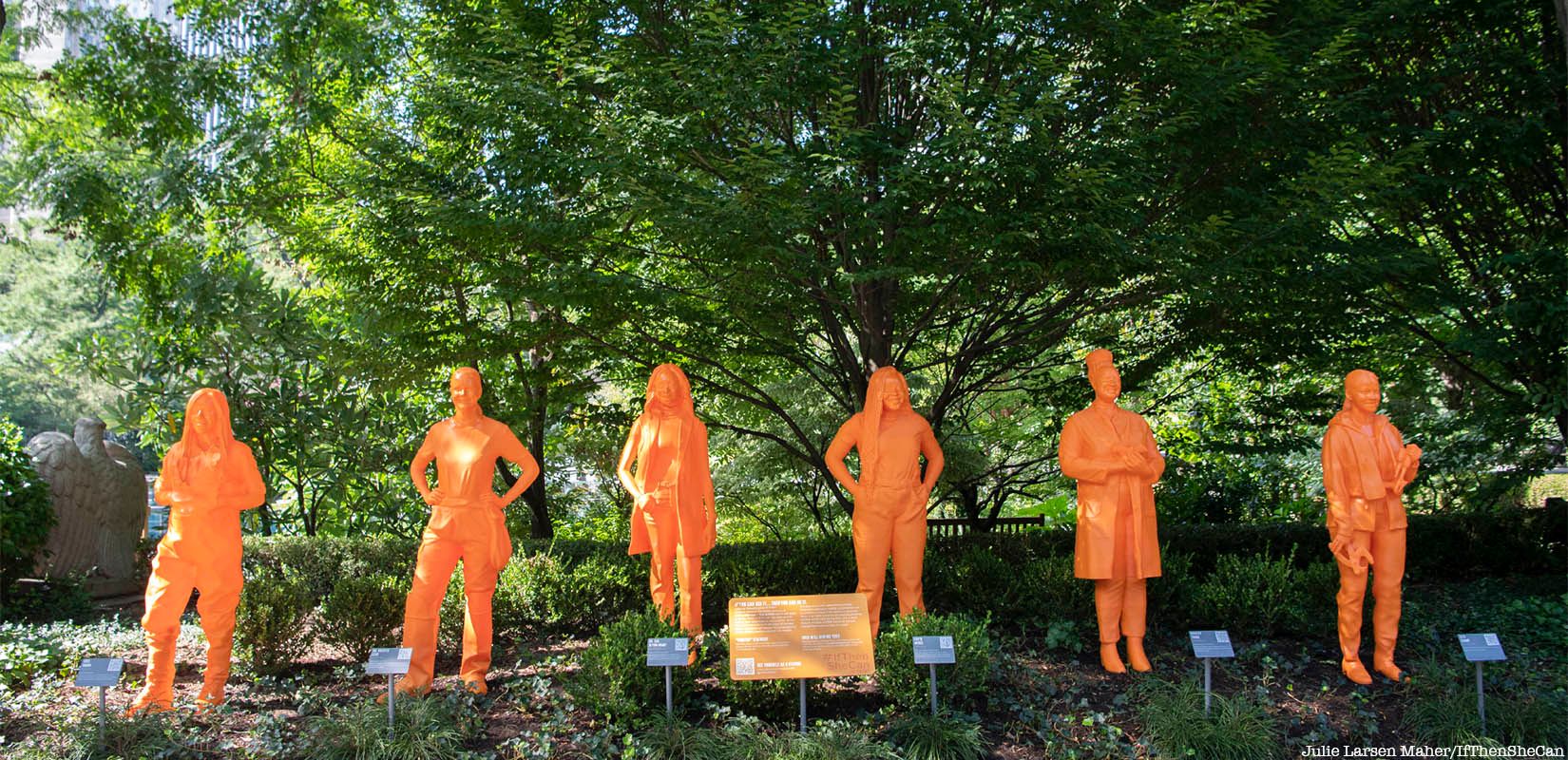
A preview of the #IfThenSheCan exhibit is on display in central park from August 17 through October 31. The exhibit features 3D printed statues of notable female scientists who have made tremendous contributions to their fields of work. The six women who will be displayed are Kristine Inman (wildlife biologist), Rae Wynn-Grant (ecologist), Dorothy Tovar (microbiologist), Jess Champ (shark researcher), Earyn McGee (herpetologist), Kristen Lear (bat conservationist).
The project represents a collaboration between the Central Park Zoo and the If/Then organization. The Central Park Zoo has recently reopened at a reduced capacity due to the COVID-19 pandemic and only visitors who have previously reserved tickets online will be able to enter. Even with these extra measures in place, the exhibit is meant to inspire women by celebrating women who are already extremely successful in a wide array of STEM fields. See more photos here.
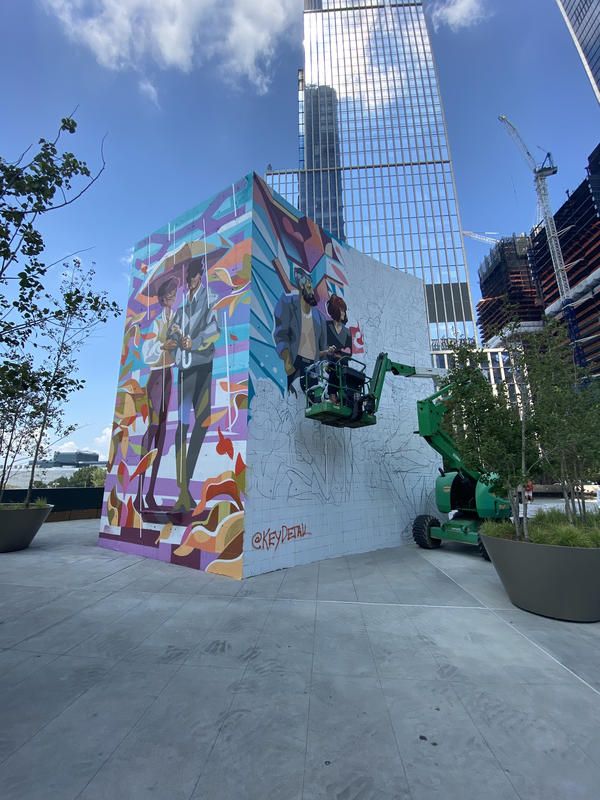
Photo by Dave Siedler.
Hudson Yards’ popular public art exhibition #HYxOffTheWall is coming to life outdoors with renowned, local artists hard at work. New large-scale murals will be visible outside on the walls of the Public Square and Gardens at Hudson Yards.
The outdoor art installation is produced by the art agency Muros and features the work of a diverse group of artists, including notable muralist Key Detail and street artist Elle. With the specific location of Hudson Yards in mind, all artwork relate back to the site’s past, present, or future. The original works will occupy more than 5,000 square feat of walls along 11th Ave. and celebrate inclusion and togetherness. The large scale pieces also welcome interaction which will allow visitors to engage directly with the art.

Jeffery Gibson; ‘Because Once You Enter My House It Becomes Our House; 2020; Courtesy the Artist; Socrates Sculpture Park; Sikkema Jenkins & Co., New York; Kavi Gupta, Chicago; Roberts Projects, Los Angeles; Image by Scott Lynch.
A massive new piece, named Because Once You Enter My House, It Becomes Our House, is now on display at Socrates Sculpture Garden in Queens. The vibrantly colored sculpture was created Jeffery Gibson, recipient of the 2019 MacArthur Foundation “Genius Grant.” It is meant to serve as a monument to inclusion and diversity.
Because Once You Enter My House, It Becomes Our House draws inspiration from and pays visual homage to Indigenous North American peoples, pre-Columbian Mississippian architecture, and to modern-day queer camp aesthetics. The multi-tiered structure is a reference to the architecture of the ancient city of Cahokia, the largest city of the North American Indigenous Mississippi people. In addition to the sculpture, Gibson and the Socrates Sculpture Garden have curated a series of Indigenous led performances that will take at the park in the coming months.
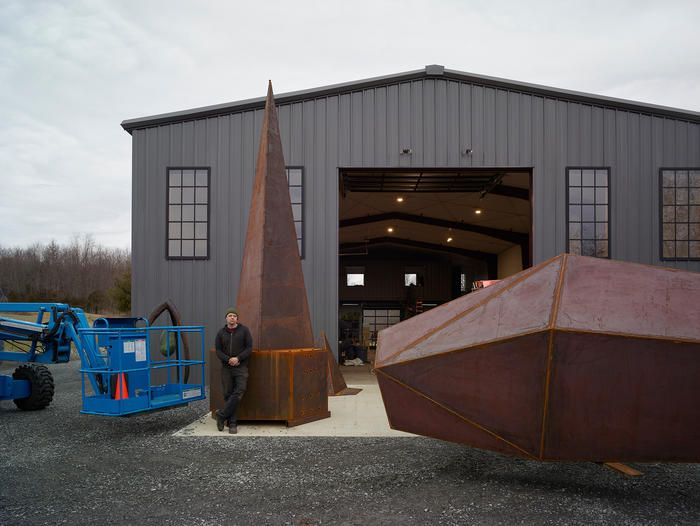
Kris Perry stands with pieces of Mother Earth outside of his studio. Photo by Daniel McCabe.
On August 12, a new, 35-foot-tall steel sculpture named Mother Earth was unveiled at Rockaway Beach in Queens. The installation is the brainchild of artist Kris Perry. It is a part of NYC Parks’ Art in the Parks, a program that brings both experimental and traditional pieces of artwork to public locations throughout the five boroughs.
The towering statue is made of Corten steel, a material that is meant to evolve and change with the seasons and the site. Mother Earth will be located at the Beach 98th Street entrance to Rockaway beach, two blocks away from the A Train. Rockaway Beach is also serviced by the NYC Ferry.

Photo: Nicholas Knight, Courtesy of Public Art Fund, NY
Reverberation, a new piece by sculptor Davina Semo is now on display along the waterfront in Brooklyn Bridge Park. The large-scale installation is made up of interactive bells and is meant to evoke public modes of communication that harken back to New York City’s maritime history. Located adjacent to the Brooklyn Bridge, the piece explores our relationship to industrial material and the built environment. And yes, park visitors can ring the bells! Reverberation will be on view through April 2021.
The installation is supported by the Public Art Fund and was curated by Daniel S. Palmer. The Public Art Fund uses contributions from individuals, corporations, and private foundations to support works of art throughout the five boroughs, including the artwork at LaGuardia Airport’s new Terminal B.
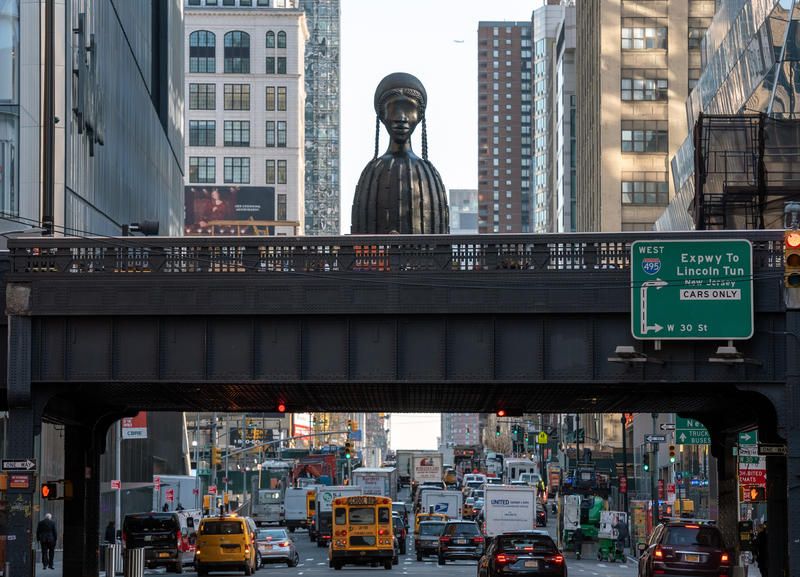
Simone Leigh, Brick House, 2019. A High Line Plinth commission. On view June 2019 – September 2020. Photo by Timothy Schenck. Courtesy the High Line
For about two months, Simone Leigh’s Brick House has been admired from afar as it loomed over 10th avenue. This month, visitors can get an up close look at the giant sculpture when the Spur, the newest section of the High Line opened on June 5th. It is the first sculpture to be displayed in the new space, which will host a series of rotating exhibits.
Brick House, a sixteen-foot-tall bronze bust of a black woman. Her head is adorned with an afro and cornrow braids along her hairline. The figure sits atop the Plinth, a new exhibition space at on the plaza of the Spur. Brick House is the first work in the series Anatomy of Architecture by Simone Leigh. The series of sculptures will intermingle architectural forms from West Africa to the American South with the human body. Brick House has been extended until Spring 2021.
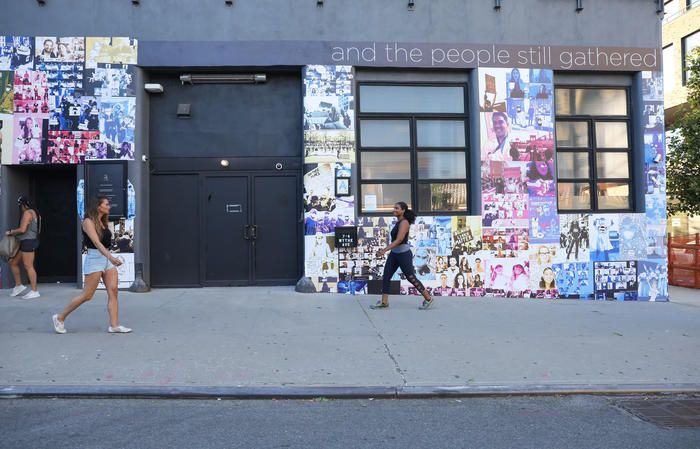 Photo Courtesy of 74 Wythe.
Photo Courtesy of 74 Wythe.
74 Wythe, a newly opened multi-level event space in Williamsburg, recently unrelieved a large-scale art installation in tribute to the Black Lives Matter movement and the inspiring people fighting the COVID-19 pandemic. The installation, named #74wythefamilarfaces, is a collage of portraits based on recent photographs and events. The piece wraps around the 15,000-square-foot exterior of the building and can be viewed outside while maintaining a safe social distance.
The installation was conceived and directed by Angela Redai of Artine Advisory in partnership with the illustrator Arianna Margulis. The artwork is one of the multiple ways in which 74 Wythe (which was slated to open this summer) is trying to give back to the Brooklyn community. The event space is donating one percent of all profits to various charities such as Black Lives Matter, the Brooklyn Comunity Foundation, and the Stonewall community foundation, and is offering meeting space free of charge to local groups involved in organizing the Black Lives Matter movement.
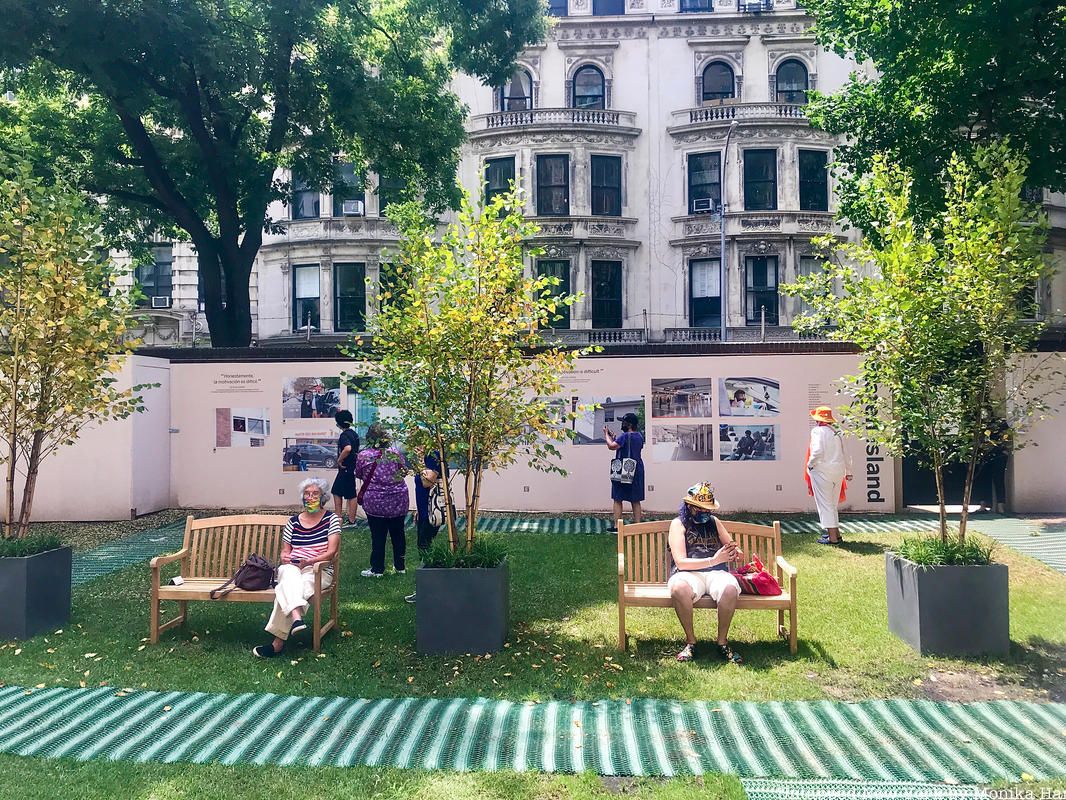
Last month, The New-York Historical Society opened its doors to visitors with “Hope Wanted,” an outstanding outdoor photo installation, which is capturing the experience of living amid the global deadly pandemic. It is focused on the toughest of times New Yorkers had faced in April, at the peak of the coronavirus.
“Hope Wanted: New York City Under Quarantine”, the first curated exhibition New-York Historical Society presented in the outdoor space, features 50 large format photographs by photojournalist Kay Hickman and several oral histories recorded by political activist, poet and journalist Kevin Powell, who originated the whole project. On April 8 and 9 the two of them visited all five boroughs, and, while risking their own health, captured pictures and talked to people from all walks of life about their experience of the pandemic. The exhibit will be on display through November 29th, 2020. See more here.
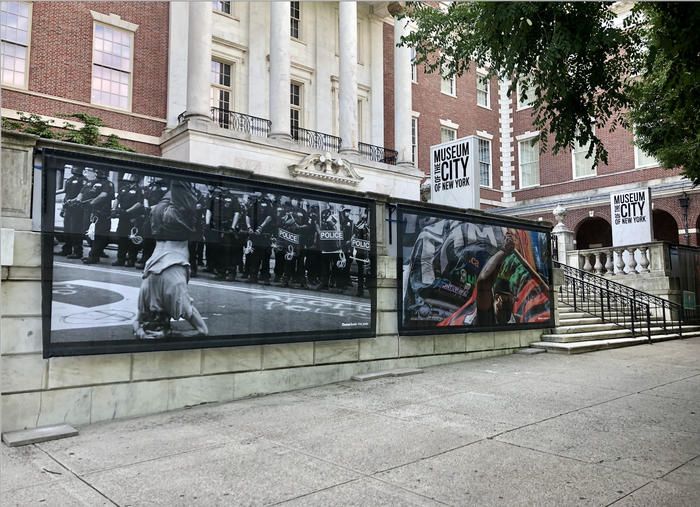 Courtesy of Museum of the City of New York
Courtesy of Museum of the City of New York
On August 1, the Museum of the City of New York will unveil its first outdoor exhibition, New York Responds. The photographic exhibit features images that document the coronavirus pandemic as a singular and monumental event in the city’s history. The powerful images also capture New York’s response to police violence. More than 15,000 images were submitted to the Museum’s open calls for stories and photographs.
Using the hashtags #CovidStoriesNYC and #ActivistNY, New Yorkers made history in real-time. Submissions are reviewed by the museum’s curatorial team on a rolling basis and may be featured on the museum’s social media feed and/or included in the exhibition. New York Responds is the first in a planned series of exhibitions at the museum this year meant to tell the story of 2020 as it unfolds. The public can view New York Responds on the exterior walls and entrances of the Museum of the City of New York.
 Black Lives Matter mural in Lower Manhattan
Black Lives Matter mural in Lower Manhattan
The Black Lives Matter movement has been driving the national conversation on racial justice and has left its mark throughout New York City. In recent months, eight Black Lives Matter murals have been created throughout New York City, with at least one mural in each of the five boroughs. The latest mural to be painted, with the help of Mayor DeBlasio, is on Jamaica Avenue near 150th Street in Queens.
In Manhattan, three murals can be found, one in lower Manhattan near Foley Square, another in Harlem on Adam Clayton Powell Jr. Boulevard, and the last in Midtown directly in front of Trump Tower. Brooklyn has two murals, one on Joralemon Street and another on Fulton Street. The mural the Bronx is on Morris Avenue and the mural in Staten Island is on Richmond Terrace near the Staten Island Ferry.
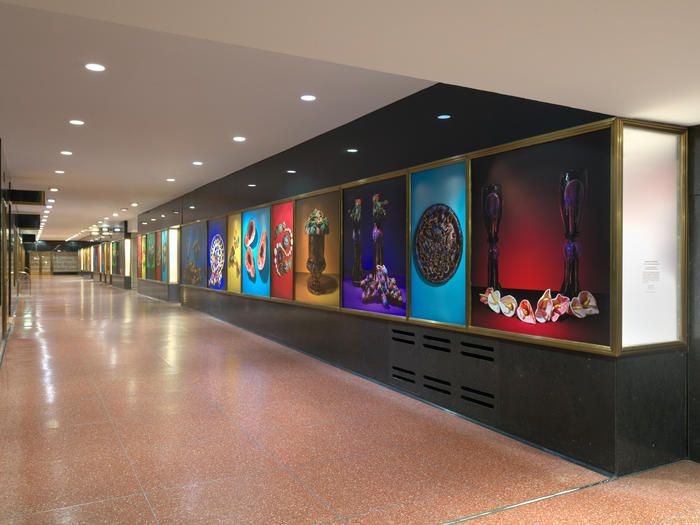
Photo by Dan Bradica, courtesy of Art Production Fund.
The work of Brooklyn-based artist Ryan Flores will be showcased all summer long at Rockefeller Center in a new exhibition entitled Low Life’s: An Upside Down Love Letter. Flores works primarily in the medium of ceramics and uses vibrant colors to attract viewers and play with their expectations. The Low Life’s exhibition will feature three of Flores’ ceramic installations inside of the glass display cases of 45 Rockefeller Center.
Additionally, other examples of Flores’ art will be displayed as large-scale images throughout the Rockefeller Plaza concourse. The exhibition is part of Rockefeller Center’s ongoing Art In Focus series and is produced in partnership with the Art Production Fund.
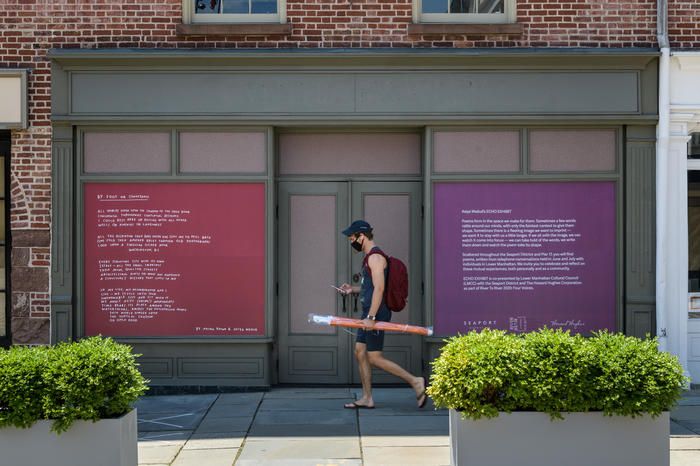
Photo by Ian Douglas.
Scattered throughout the Seaport District and Pier 17, you can now find a series of poems written based on telephone conversations held by individuals in Lower Manhattan during the months June and July. The display of the poems was designed by Shannon Finnegan. The poems, which together are named Echo Exhibit, are meant to serve as lasting evidence of the conversation between strangers during the quarantine, capturing the unique qualities and emotions of the situation.
Echo Exhibit is a part of the Lower Manhattan Cultural Council’s (LMCC) summer festival, an event created in the aftermath of 9/11 to help heal and celebrate the area’s resiliency through the power of art. The festival continues to celebrate resiliency this year as the exhibits are all imbued with the context and meaning of the COVID-19 pandemic.
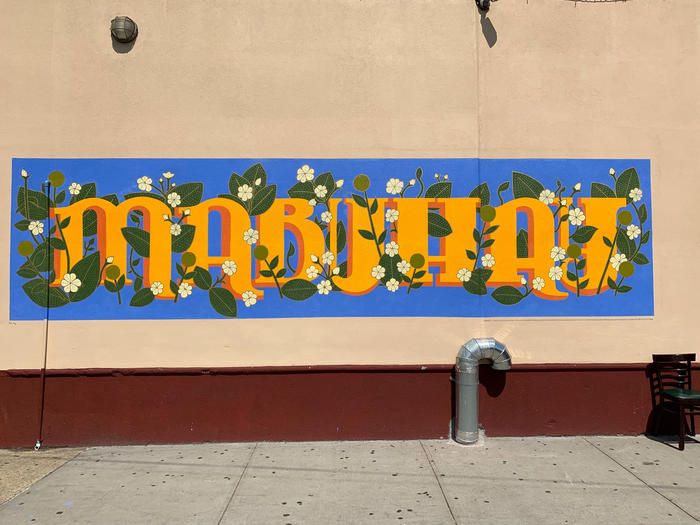
Little Manila Queens Bayanihan Arts, Courtesy The Laundromat Project.
In the Woodside neighborhood of Queens (also known as Little Manila), artists Xenia Diente and Jaclyn Reyes are creating a series of community art pieces to celebrate the area’s Filipino Community. The brightly colored mural on the side of Amazing Grace Restaurant and Bakery, at the corner of 69th Street and Roosevelt Avenue, says “Mabuhay.” This Filipino expression can mean “welcome,” “cheers” or “may you live.”
The two artists are working with Filipino-American residents, local businesses, the Laundromat Project, and other organizations in the neighborhood to create colorful and celebratory murals. Over half of New York City’s Filipino community lives in the borough of Queens. The new mural on Roosevelt Avenue is meant to celebrate the richness of the Filipino experience in Queens and aims to put Little Manila in dialogue with nearby immigrant communities from South Asia, Southeast Asia, and Latin America.
Next, check out our upcoming tours to explore more of New York City!
Subscribe to our newsletter